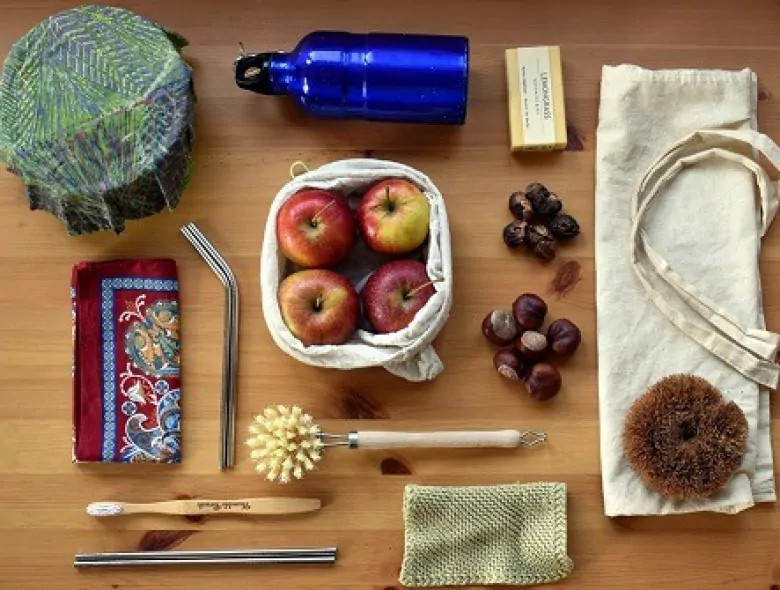In Japan you will often hear people say mottainai, meaning ‘what a waste’. Many of us are trying to do what we can to work towards a healthier environment. I believe that trying to be more eco-friendly should go hand in hand with saving money so here are some tips on easy changes you can make in the kitchen to be a little greener and save money on your apartment in Japan.
There are some really great innovative eco kitchen products, from eco-friendly kitchen cleaner to zero waste kitchen towels, that will help you be more sustainable and can be great investments, helping you save money in the long run.

Change Number 1: Washing up and Kitchen Sink Waste
Avoid classic sponges. They’re made out of plastic and release microplastics into our kitchen sink waste. These microplastics can then absorb toxic chemicals, such as pesticides, and end up in the ocean where the chemicals can be fatal for sea life.
Fortunately, Japanese loofah sponges work just as well without causing so much harm to the environment, they’re one of the most popular eco kitchen products for a good reason. Before sponges became common, Japanese people washed their dishes with cotton cloths. This is another easy zero-waste swap; however, some cotton can be unsustainable so try to find organic cotton (where the cotton is grown using rainwater instead of using up villages water supplies) or recycle old cotton items. Both of these methods will cut down on the number of harmful things going into the kitchen sink waste.
Tawashi are a traditional Japanese brush used for scrubbing vegetables, but they can also be used for scrubbing and washing up your pots and pans and shouldn’t leave scratches. They’re made from plant material, so they are biodegradable! You can find them in most general stores and 100-yen stores.

Change Number 2: Eco-Friendly Kitchen Cleaner
Changing to an eco-friendly kitchen cleaner is a small change you can make to be more sustainable. There are eco-friendly kitchen cleaner sprays available in stores such as Nitori. Check out Shabondama, Happy Elephant, Koala Eco and Orange X products.
Instead of spending money on these products, you can make your own eco-friendly kitchen cleaner from cheap and simple ingredients. Mix together the juice of 1 lemon, 1 cup of vinegar (ideally white vinegar but grain vinegar works), 1 cup of water and an old spray bottle to mix it into. If you want your eco-friendly kitchen cleaner to have a scent you can add around 10 drops of an essential oil too.

Change Number 3: Zero-Waste Kitchen Towels
Getting through rolls of kitchen towels isn’t very good for the environment, and it can seem hard to swap out something that’s so useful and easy to use. But It’s not as hard as you might think! Organic cotton cloths or microfibre towels work well as zero-waste kitchen towels and you can easily pop them in the washing machine. But to save money, instead of purchasing zero-waste kitchen towels you can make your own from old t-shirts and towels!

Change Number 4: Packing and Storing Food Sustainably
It’s difficult to find plastic-free products in Japan, but not impossible! Try looking in small local fruit and veg stores, tofu stores, soy sauce stores and you might find places where you can use your own containers. Instead of investing in eco kitchen products, reusing items instead of binning them will help to avoid creating more waste. Plastic food containers, takeaway containers and glass jars can all be used creatively to store food and other goods.
If you’re struggling with how to remove labels from glass jars, the easiest way is to pour hot water into the glass jar and let it melt the label glue, after a while the label should peel off. Oil will help to remove any sticky residue as well.
Plastic cling wrap and zip-lock bags are very helpful for packed lunches and storing food in fridges but there are innovative and eco-friendly alternative eco kitchen products that are much more sustainable!
Beeswax wraps are a natural product that can be used to cover and wrap all sorts of food from bread to vegetables. They can be cleaned easily with cold water but avoid washing them with hot water as it will melt the wax that keeps the wrap sticky. Japanese brand, aco wrap sell them or, for a fun DIY project, you can make your own.
Instead of binning leftovers, cooking small batches of food and buying packaged meals from the konbini, batch cooking will save energy (and your time too!). Reusable bento boxes are one of the eco kitchen products that help cut down on kitchen waste. The Sunaho bento box coffee is a dishwasher-friendly Japanese bento box that’s fully compostable and made from plant fibre powder and coffee grounds that would have otherwise gone to waste.
Try out the tips that you think will work for you and get creative with ways you can reuse things you already have around your apartment, good luck with it!



